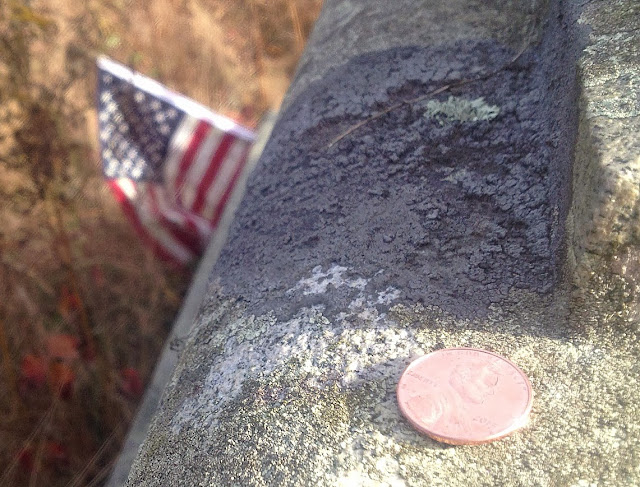 |
| The approach to the cemetery where Rodman is buried. |
 |
| I.P.R, initials for Isaac Peace Rodman, on his gravestone among the weeds. |
 |
| I placed a shiny penny, Lincoln side up, on Isaac Rodman's memorial today. |
 |
| The date Rodman suffered his mortal wound at Antietam is incorrect on his monument. He was mortally wounded in the left breast on Sept. 17, 1862. He died 13 days later in a Sharpsburg field hospital with his wife, Sally, by his side. |
 |
| Isaac Rodman was only 40 years old when he died. |
Days after Brigadier General Isaac Peace Rodman died from a minie ball wound suffered at the Battle of Antietam, his body was returned to his native Rhode Island, where he was given a hero's funeral. On Friday, Oct. 3, 1862, flags in Providence were at half-mast and business in the state capital "ceased its harsh and discordant hum" as citizens mourned the highest-ranking officer from the state to die during the Civil War. A funeral service for the married father of six children was held at the State House, the first time it had been used for such a purpose.
Thousands viewed Rodman's body as he lay in state in the hall of the House of Representatives under a canopy of black and white drapery and an American flag. Evergreens and flowers covered the metallic casket that was inscribed with Rodman's age ("40 years, 1 month, and 16 days") and upon which rested the general's cap, sword and belt.
"Our country mourns his loss," an inscription on the north side of the hall read. Shields that included the names of all the battles Rodman participated in -- Bull Run, Roanoke, Fort Macon, Newbern and Antietam -- also adorned the hall.
Later that weekend, Rodman's coffin, escorted by the Pettaquamscutt Light Infantry and Narragansett Guards, was placed on a train bound for the general's hometown of South Kingstown, 35 miles south of Providence. At the railroad stop in South Kingstown, a half-mile procession of carriages and people on foot escorted Rodman's casket, which was covered with flowers and an American flag, to the Union general's house.
At Rocky Hill that Sunday morning, "the business acquaintances of the deceased, his friends and neighbors for miles around, came pouring in to mingle their tears of sympathy with those of the bereaved family." In all, nearly 1,500 people paid respects to the man who before the war ran a textile mill with his brother in South Kingstown.
In the afternoon, mourners gathered at the small Rodman family cemetery atop a hill in Peace Dale to bid him a final farewell. "Here, at the mouth of this opening grave, a voice is addressed to us which we must heed," a reverend reminded those who attended. "To this we all are coming. Dust to dust." Three volleys were fired over the casket before it was covered by earth that fall day, the sharp reports undoubtedly heard less than a mile away in the center of town.
"He is rather to be envied than pitied," an account of his funeral noted. "We have no further solicitude for him. No accident can now tarnish his fame. No temptation can assail human nature at its weak point. The seal of finished virtue is set upon him. Happy is he, and he alone, who has begun, continued and finished his course in virtue. As a Christian patriot, he has done his appointed work, and it now becomes a part of our national history."
Sadly, Rodman's final resting place today is in a state of neglect. (See my interactive panorama below.) Once surrounded by open pasture land, the small cemetery is now an ugly island bordered by a large, and noisy, sand and gravel operation. Weeds, briars and poison ivy choke the small plot of land that is surrounded by a thick, 2 1/2-foot stone wall. Many markers are toppled or broken. The general's gravestone, masked by vegetation, is simply marked with raised initials "I.P.R." On Wednesday, a tipped-over flower pot with a U.S. flag and an old, metal Grand Army of the Republic marker lay in front of a tall family memorial for Rodman. "His country called him," the inscription on it reads, "and for her he died."
UPDATE: The owner of the property said he will have his employees clean up the cemetery, according to this Providence Journal story.
Source: The Narragansett Times, Oct. 10, 1862.

He should be moved to Antietam Natl Cemetery
ReplyDeleteYes, he should since his RI people have no concern for his service. He is truly a RI hero who has been neglected for too long.
DeleteThe locals have not forgotten about him or his service. We have tried many times over the years to clean the cemetery but the overbrush comes back a month after we have cleaned it up. My group alone has been there 3 times in an 18 month span. The local VFW Post and Boy Scout Troop has also gone in countless times over the past decade.
ReplyDeleteThe Town of South Kingstown Needs to provide perpetual care to honor the sacrifice of this outstanding son of South Kingstown!
ReplyDeleteThank you for your service Isaac Peace Rodman
ReplyDelete